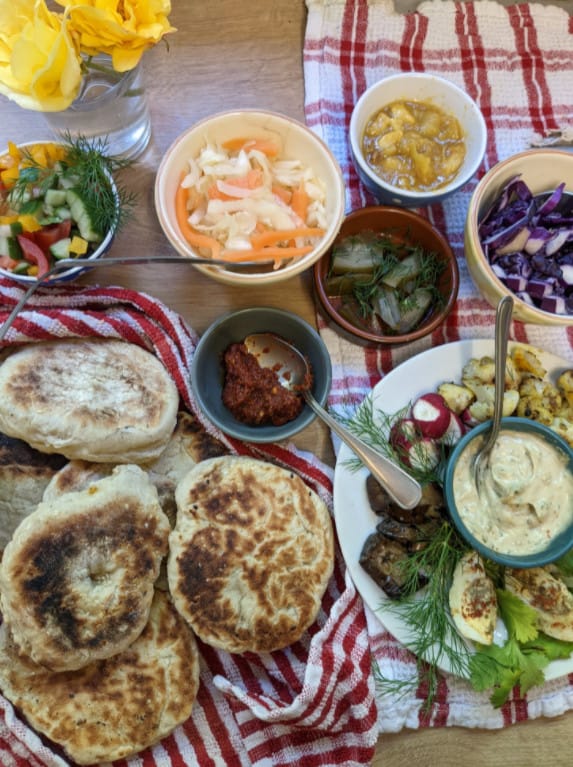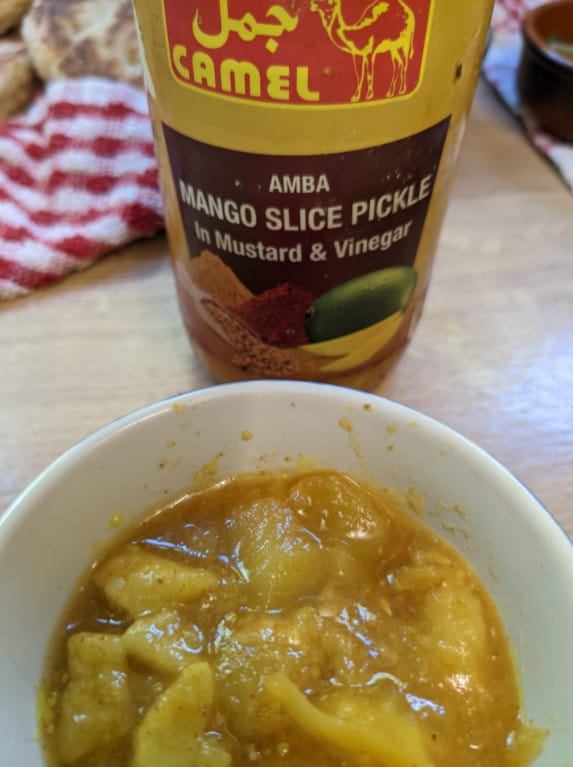You could call Sabich a fried eggplant sandwich, which it is at its heart: but it also has lots of other things, movable things: hard-boiled egg, salads, and condiments such as creamy sesame-seed tahini, fiery zhug or harissa, and amba, a bright yellow sauce of pickled mango and fenugreek.
(Though an Israeli friend says that her favourite Sabich place refuses to let her omit the egg and she hates hard-boiled egg, so lets say: in theory you can vary the other ingredients).
Sometimes a few potato slices are added, sometimes a slice or two of tender sweet cooked beets.
So call it a fried eggplant sandwich, or call it a salad bar stuffed into a pita (with hard boiled egg), but when you are calling this sandwich a Sabich, how do you pronounce it?
Looking at the word, I imagine a big ol’ shlumpy guy named Sahb-bitch, a shlub-like guy’s guy, definately a western (Ashkenazi) guy, someone who would have been working at my uncle’s plumbling shop once upon a time, or driving a taxi, or fressing at the goodies table at (an Ashkenazi) Bar/Bat Mitzvah.
But the truth is that Sabich, OUR Sabich, is not pronounced that way at all.
The name is Iraqi, and so pronounced: SAY-BEEHK.
Something like that.
Pronounced this way, it sounds elegant to me.
So: Sabich Tzvi Halbi, an Iraqi immigrant to the Tel Aviv suburb of Ramat Gan (both areas of large Iraqi immigrant communities), is said to have opened his shop in 1961, and there sold his first salad-stuffed pita.
Others say it originated in the street vendors around Tel Aviv’s central bus station, which before the new one was built, was an aladdin’s treasure chest for street food.
Still the Iraqi eggplant sandwich, but a different location.
This is the version of the story I love best, as I loved that jumble of stands selling felafel and borekas and fried eggplant/aubergine/melanzane/hatzalim soooo much.
And, suddenly we are on the streets of Israel and Sabich is sharing his family and community food tradition—in sandwich form— with us.
But why overlook an opportunity to argue about something?
Some say the name Sabich comes from the Arabic word for breakfast – the combination of eggplant, hard-boiled egg and potatoes or is an acronym in Hebrew for those ingredients, come on: We have the sandwich, and the guy selling it whose name is the name of the sandwich, why do we need another story about how it came to be?
But how did it get from the breakfast table to the streets of Israel?
After all, shwarma and felafel are so popular, and they have the salads and sauces too—why would a pita filled with only the salads and sauces become so famous, so popular?
Its not like our friend Sabich was looking around for the next new big thing to invent to make himself famous. And yet…thats exactly what happened.
I’ve heard that since he was closed on Shabbat, on Friday people would come to him, especially bus drivers which is another reason I think of yes: the bus station! and Sabich the felafel maker would make a special pita sandwich of all of his leftover vegetables and sauces.
People would stop in and exclaim: Sabich! A special sandwich!
This version appeals to me because of the wide array, nearly salad-bar-like of vegetables in many felafel shops.
A whole day closed, Shabbat, the salads need to be eaten now—at the start of the week, they all need to be fresh.
It makes sense.
The dish is simple to assemble: prepare the ingredients and set them out to stuff the pita with.
Fat fluffy pita is best, but the original was a laffa, or thin Iraqi flatbread. I’ve been using a tender small cross between the two, sold at my local supermarket.
Since more pita is not as fresh and tender as is most delicious, I recommend warming up the pita first to make it more fragrant, soft, pliable.
But then I tweaked around my (okay, in fact, good, but not fantastic) usual pita recipe and decided: the sandwich is good with an ordinary pita or flatbread, but really really good with fresh fat pita.
Without the soft, chewy fluffy pita, the delicious jumble of tastes and textures is…too much of a good thing.
The super-savoury-sour-crunchy-herby-spicy-add more adjectives as necessary salad ingredients. need the balance of the bland, comforting pita holding it together.
Putting it all together: Lay out the ingredients in bowls/plates, heat the pita unless its super fresh, and either make them up individually or let people make their own.

Here are the ingredients:
The eggplant: slice an unpeeled eggplant/aubergine crosswise, about 1/2 inch thick–thinner or thicker, as you like. Lightly salt them, and leave to drain an hour or more or less.
Rinse, pat dry, and pan-brown over a medium heat in a small amount of olive oil, though enough to brown the vegetable.
If I’m making this specifically for Sabich or other Middle Eastern dishes, I’ll sprinkle it with ground cumin towards the end of cooking.
The truth is though that often I will just fry up a bunch of eggplant, some for Sabich, and others for pasta, braised vegetables, salads, and so on.
Israeli Salad: Finely dice some unpeeled English cucumber, tomato, red/yellow/green pepper; I like to add a little fresh dill.
If you are eating it on its own, season with salt, and add a little garlic, onion, oil and vinegar, but since this is going into our Sabich, don’t bother dressing it–there is already a lot going on in this sandwich.
Chopped parsley (sometimes I use chopped cilantro or even fresh mint, instead).
Amba: There are two different kinds of Amba, the Indian one and the Israeli one which likely came with Indian immigrants.
The Israeli one is usually hard to purchase outside of Israel, but the Indian one, subtitled: Spicy Mango PIckle, is easily found in any area with an Indian population. Its super tangy-tasty.
But distinctively Indian–to give it the more Israeli flavour, add soaked, then pounded in a mortar and pestle, fenugreek seeds.
Fenugreek seeds give a distinctive taste to many Israeli dishes (as they do to many Indian ones): Hilbeh is the Israeli food that comes to mind: soaked, pounded, fenugreek seeds mixed with spices and grated tomatoes.
Fenugreek is slightly weird: smells a bit like maple syrup but not sweet.
You won’t mistake it for anything else.
Also: its seeds are as hard as tiny rocks. So: to use: Pour boiling water to cover over a tablespoon or two of fenugreek seeds, and leave to soak several hours or overnight, until the seeds are soft (they get slightly gelatin-y, too, as many seeds do when soaked).
Next, place in a mortar and pestle and pound until it forms a lumpy paste.
By the way, Israeli amba is a puree while Indian amba is chunky, so mash the chunks of mango if you like, choice is up to you.
Stir the soaked mashed fenugreek into a small bowl of amba.

Shredded red cabbage
Cauliflower: Break into florets, blanch, then pan brown in olive oil with a sprinkling of cumin.
1 per person
1/2- 1 hard-boiled egg per person, peeled then sliced or quartered. Arrange on a plate and sprinkle with cumin and hot paprika.
Boiled potato or beet (optional)
Pickles: slice up a sour dill.
Sauerkraut: If you love it (as I do with all my heart), include it on your assortment of salads: And if you make your own, as I predictably do, use that one.
At its best when just about but not quite fully fermented.
PS homemade using both cabbage and carrot.
Harissa or zhug:
Tahina: This loose recipe makes about a cup of tahina; leftover is not a problem: combine with chopped parsley for a green dip, or with mashed roasted eggplant for baba ghanoush, or with leftover sliced browned eggplant for a meze, or with roasted cauliflower florets…or? maybe its time to make felafel?
Anyhow: stir 1 cup of tahini until smooth, then add 3 cloves mashed garlic, several pinches of salt, cumin and ground coriander, then stir in juice of 2-3 lemons, and enough water until it is as thinned or thick as you like–1/4 to 1/2 cup should be about right.
Fat, Fat, Homemade Pita
So, flipping through the internet on the subject of pita recipes, an article about a « good witch », a good cooking witch, caught my eye.
For one thing, it was stuffed before baking, stuffed with things like chopped liver, or spicy mashed pumpkin, and for another thing: the texture looked good.
It was in a leading Israeli newspaper, Ha’aretz, and never mind that I still nurture a grudge about the way they dissed my make-up (in print!) and were snippy about my cookbook (without having read it), and let me take this moment to say: I ONLY HAD LIPSTICK ON, you goons.
(Okay, it was red so not subtle).
Anyhow, I was intrigued by the recipe, so used it as a starting point, deciding that if it looked good stuffed, it would probably also be good unstuffed.
(PS I changed nearly everything in the recipe fyi).
And it turned out delicious.
To be honest, I used Italian 00 flour, the kind used for pizza, instead of all purpose flour, and oh, it has so much flavour, and wow what a great chewy texture. It didn’t form a pocket easily, or at all to be honest, but i cut into it and voila: a pocket!
1 1/4 lbs/ 1/2 kilo unbleached white flour (or, you can adjust flour mixture to be: 1 part wholewheat, and 2 parts unbleached white).
1 1/2 teaspoons salt
2 1/2 teaspoons dry yeast
1 tbsp sugar
1 1/4 cup /12 fl oz/ 350ml body temperature water
Aproximately 4-6 tablespoons self-rising flour, or any all purpose flour with a pinch or two of baking powder added
1/4 cup/4 tablespoons olive oil
Combine the flour, salt, dry yeast and sugar in a large bowl.
Pour 1 cup of the warm body temperature water over it. Leave for several minutes.
Start mixing with a large spoon, and when it forms a dough, start kneading with your hands.
After a moment or two, add the rest of the water until it becomes very soft and pliant.
Remove the dough from the bowl, sprinkle with the self-rising flour, and continue to knead until smooth and lump-free.
Form the dough into a ball, return to the bowl and cover the ball with the olive oil, moving it around so its coated all over, top and bottom and sides.
Cover with plastic wrap or a damp towel and let rise for an hour in a warm place, until doubled in volume. I have been using a sunny window on warm days, and find it perfect: so warm, the dough just seems to burst into happy volume.
Uncover, press the dough down, knead a little more, then with oiled hands roll the dough into balls: say 10-12 for small but sturdy pita–you can make them larger, but they are filling.
Place the balls on a floured pan, and cover again with the plastic, leave again in a warm place–this time for 30 minutes.
Heat a heavy flat frying pan over a medium-low heat, and working on by one, take a ball and flatten slightly with your hands, then place the dough–which is soft and kind of un-handable–into the hot pan.
You want the pan hot, but monitor the heat because too hot and the pita will burn.
I found myself heating the pan higher, then turning it down, in response to the progress of the little flatbreads.
My pan was the right size to cook about three at a time. When one was finished, I’d put it into a clean towel with the others, all equally warm, then close the towel up again, rewrapping the pitas. Its like making tortillas: the breads need that gently steaming effect before eating.
And a tiny note of practicality: any extra pita can be frozen, and pulled out one by one when needed.
Enjoy by Marlena Spieler


